
FROM SARAH, OUR SABRA
ON THE GROUND IN ISRAEL
Dear Friend,
Greetings from Israel. Last month I discussed some of the major political changes that Israel is experiencing since our last elections, specifically our judicial system’s reform. Here, I follow up with another change in Israel: the attitude toward peace. For most of its 75 years, the modern State of Israel has openly pursued peace with neighboring countries and people who live within its borders. While Israel has peace agreements with Jordan and Egypt, peace with Syria and Lebanon seems impossible. What remains is perhaps the most difficult and pressing issue — the Israeli-Palestinian conflict.
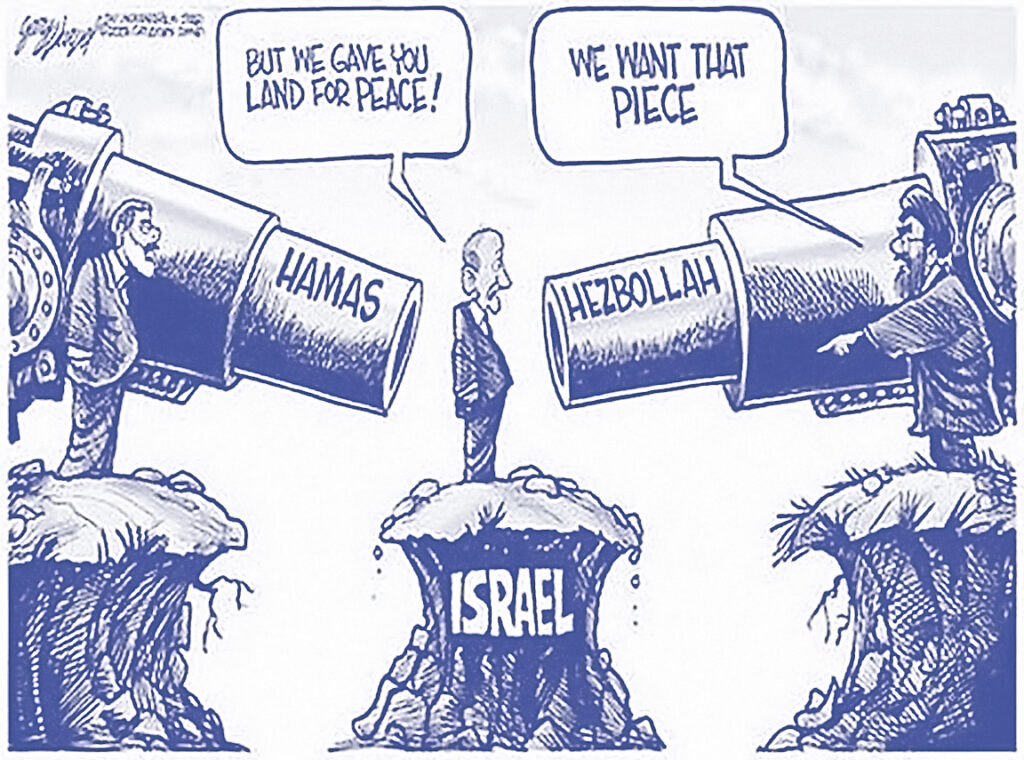
The Two-State Solution
Since 1947, the proposed resolution to this conflict has been known as the “two-state solution” — a Jewish state existing alongside a Palestinian/Arab state — with defined borders and peace between the two. Journalist Joan Peters covered this history in her book From Time Immemorial. [Editor’s note: Zola talked with Joan Peters about the conflict and the two-state solution in several episodes of Zola Levitt Presents. Please see levitt.tv/media/person/Joan+Peters]
Over the past decades, the big question concerned how to divide the land. A larger issue was that the two-state solution required the Arabs to acknowledge Jewish rights to the land (even if only in part), which they refused to do. In 1982, however, the Palestinian leadership adopted this idea, and pressure mounted for Israel to embrace the two-state solution. But as then-Prime Minister Yitzhak Rabin prepared to sign a “land for peace” agreement with the Palestinians in 1995, a right-wing Jewish man assassinated him.
Despite continued global support for the two-state solution, public opinions for both Israelis and Palestinians have changed. Waves of terrorism and deadly attacks, along with reactionary Israeli army campaigns in Gaza and the “West Bank” areas, have influenced this shift. By 2021, 60% of Jewish Israelis no longer backed the two-state solution, and few still advocate a land-for-peace deal. While most Palestinians favored the two-state solution in 2009, five years later about 60% affirmed the plan to “reclaim their historical land from the river to the sea” — from the Jordan River to the Mediterranean Sea. Also increasing are the Palestinian calls to use violence in taking the land and eradicating the Jewish state.
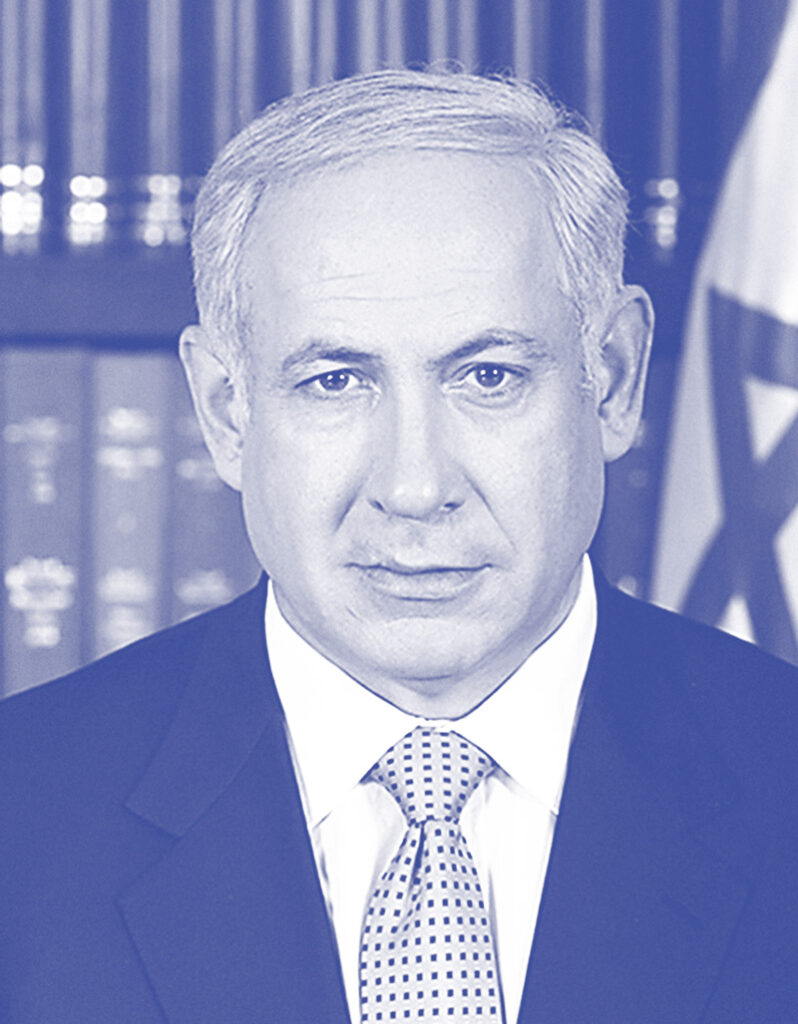
Declining Peace Prospects
Prime Minister Benjamin Netanyahu has never supported the two-state solution. Nor has he spoken about it or any other solution to the conflict. For the past 13 years, he has offered hope by stating that Israel desires peace. Yet he has continued to work toward weakening the Palestinian Authority and allowing more Jews to move to Judea and Samaria — the disputed areas of the land. In Israel, those who live there are called settlers, and the villages, towns, and cities they build are called settlements.
In the Israeli elections in November 2022, parties representing the settlers surprised everyone when they made their most significant gain (14 parliament seats) to date. Bezalel Smotrich is one of the leaders of these parties. For many years, he was a radical in parliament whose ideas never gained broad support. But with changing Israeli opinions and strategic alignments he made in the recent election, Smotrich gained a significant ministerial post with power to bring change.
Our history as a modern state has taught us to scrutinize the writings of our politicians before they gain power because those words indicate their plans. According to Smotrich, Israel should abandon all attempts to make peace with the Palestinians. His plan calls for a resolution — by force.
The Smotrich Plan
In 2017, Smotrich revealed a plan that he claimed would succeed where others have failed. In a public manifesto, he stated that Israel should stop trying to appease the Palestinians and others with a false hope of a peace deal. He rejected a two-state solution, noting that there will never be peace as long as two opposing peoples are forced to live together on the same parcel of land.
Smotrich denied that the Palestinians have a right to self-identify as a nation within this land. He criticized Israeli leaders for trying to “manage” the conflict for decades, which only brought more deaths and declining global support for Israel. His plan is based on three main principles:
- The two-state solution is unrealistic and should not be pursued.
- The return of Jews to their land — after 2,000 years of exile and persecution — is a historic, moral, and just imperative.
- The notion that Arabs can’t be discouraged from having a national expression (like citizenship, a state, etc.) in the Land of Israel is incorrect.
The first phase of his plan is discouraging any hope of an Arab state in Israel. He claims that the government should release a statement clarifying — in no uncertain terms — that there will never be such a concession. By extinguishing this hope, Smotrich believes that the motivation for terror acts will dwindle — an idea that many claim is ludicrous. He says this should be not only declared but also backed by action — a massive investment and development in populating Judea and Samaria with Jewish cities. This will show Arabs and the world that there is no chance for their dream of “Palestine.”
The second phase of his plan refers to the fate of Arabs in Israel. Smotrich offers three options:
- Arabs who accept the Jewish state and choose to live within it will not be citizens and will not be able to vote (and thus have no representation in parliament). They will, however, receive the benefits of living in a modern state with local elections for their municipalities only.1 (This will keep them in limited areas with limited rights.)
- Arabs who choose to leave will be given assistance to start a permanent new life in another Arab country or another destination.
- Those who make no choice and continue to carry out violence against Israel will be dealt with harshly as terrorists.

1 Demographics is the reason for removing their right to vote. If 7 million Jews and 5 million Arabs all had the right to vote, in less than a generation, a majority of Arabs could assume power via national elections.
Initially, most Israeli leaders considered Smotrich’s ideas as a joke. Now, however, in his pivotal position of power, Smotrich has begun to effect changes, albeit slowly, using diverted funds and other security considerations to bring his plans to fruition. Critics assert that his plans will isolate Israel on the global stage, bring harsh sanctions against it, and result in massive violence between Jews and Arabs. But this could result in the fulfillment of Zechariah’s prophetic words: “On that day, when all the nations of the Earth are gathered against her, I will make Jerusalem an immovable rock for all the nations. All who try to move it will injure themselves” (Zech. 12:3).
Biblical Response
We as Believers in Yeshua/Jesus as Messiah must turn to the Word of God to understand His plan and direction as we evaluate man’s ideas.
When Israel prepared to enter the land after 430 years of slavery and wandering, God instructed Moses and Joshua not to make any agreements (peace treaties) with the people who lived in the land. Thus, many believe that the idea of land for peace or a two-state solution directly opposes the Word of God.
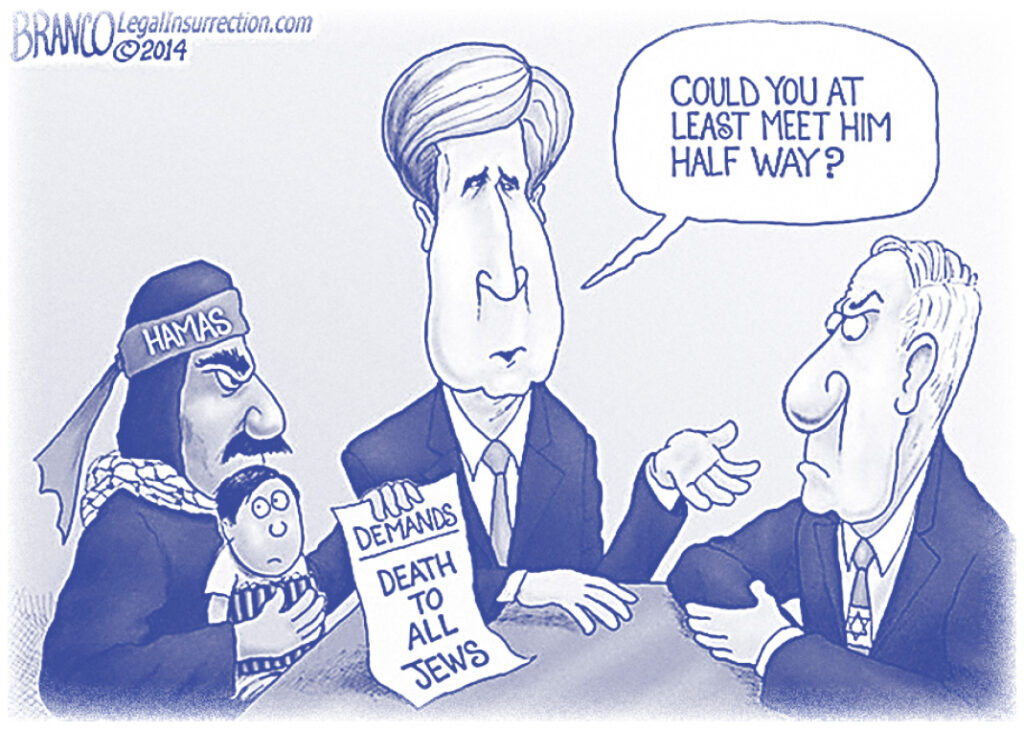
On the other hand, in the Law (Torah) God repeatedly instructs Israel about how they should treat foreigners (non-Jews) living in the land: “When a foreigner resides among you in your land, do not mistreat him. The foreigner residing among you must be treated as your native-born. Love them as yourself, for you were foreigners in Egypt. I am the Lord your God.” (Leviticus 19:33–34).
It is therefore incumbent upon us — the Jews in the land — to uphold God’s Word in how the non-Jews are treated. This is something that our government has failed to do (though many say for good reason), which has caused much pain, suffering, and violence.
I remember reading this prophecy as a teenager: “… Peace, peace they say, when there is no peace” (Jeremiah 6:14b). I thought, “Here it is, in black and white — there will never be peace.” Growing up in this land, always in the shadow of this conflict, it is hard to find hope for this situation except in the Lord. The only answer is the salvation of Israel and, in fact, of everyone in the Middle East. We here in Israel continue to pray for this land and its people.
Thank you for praying with us.
Im tirdefu lada-at oto —
“Press on to know HIM!” (Hosea 6:3 NLT), ✡
Sarah Liberman
 : Not If, but When
: Not If, but When
I (Kirsten) was talking with a woman about her desire to go to Israel. She kept saying “If we ever get to go.” I told her she should instead say, “when we go.” Live in anticipation of your expected trip, which could be in 2024. David and I anticipate meeting many of you for our Spring Tour to the Holy Land. March is a spectacular time to visit. The hills of Galilee are brilliantly green and lush, and flowers are blooming everywhere. For an added bonus, the Petra Extension is remarkable!
Our tour manager, Sandra, is ready to answer all your questions. You can contact her at 214-696-9760, travel@levitt.com, or levitt.com/tours. And if this March is too soon, plan to join us on next year’s Fall Tour. We’ll see you on the tour bus!
| Deluxe — Israel | Mar. 25–Apr. 4 | $5,788 |
| Grand Petra — Israel & Petra | Mar. 25–Apr. 7 | $7,388 |
A Note from David and Kirsten Hart
OUR CREW
While we are on camera each week, we are only a small part of the team that produces the weekly television programs that have been airing for 43 years. We work with several phenomenal men and women who wear many hats to prepare everything necessary for Our Jewish Roots (OJR). This month, we’d like to introduce you to one of them.
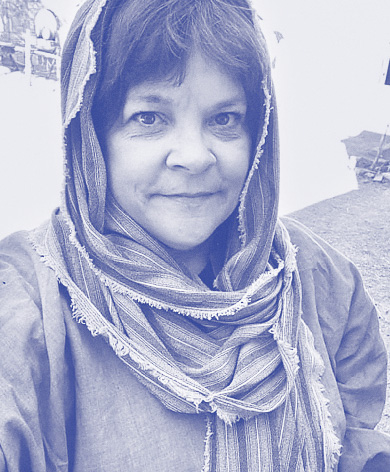
Andrea Davis is truly the glue at Berg Productions — the production company for OJR (previously Zola Levitt Presents) since the beginning. She recently celebrated 27 years as the general manager of Berg Productions. You rarely see her, but her work is essential. Andrea also handles all of ZLM’s social media and designs the monthly Levitt Letter crossword puzzle.
Fun fact: Andrea designed and made many of the costumes for our dramatic reenactments. One of our most popular series, Faith of our Fathers, showcases her costume and set designs.
IT TAKES A (GIFTED) VILLAGE
It’s been said that “it takes a village to raise a child.” Certainly, it takes a “village” of gifted Believers to produce OJR each week. We are thankful for this village that we have been involved with for over seven years. The production team members consistently go above and beyond to make sure that you receive the Good News of our Lord in creative and authentic formats. Spreading the Jewish roots of Christianity is our heartbeat. We pray that we can continue doing so for decades.

Sha’alu shalom Yerushalayim! —
“Pray for the peace of Jerusalem!” (Psalm 122:6),
David & Kirsten
P.S. It also takes a village to keep this ministry financially viable. Our faithful supporters help pay our bills and production costs. We would be overjoyed to see ZLM end 2023 on a financial upswing. Our giving has declined this year, and we are trusting the Lord to raise up additional supporters from our viewing audience. If you watch our program but have never donated to this ministry, would you consider partnering with us? Thank you for your faithfulness and dedication. Shalom. ✡
Our Jewish Roots TV programs in October
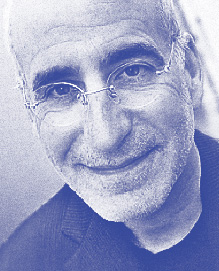
This month we continue our newest series, Dateline Jerusalem: The Coming Temple. This series is both intriguing and filled with “hot topic” programs. While Dr. Jeffrey Seif teaches from the Holy Land, Joshua and Caleb Colson, our new OJR teachers, add their insights from the studio, joined by Kirsten and David Hart. Don’t miss a single episode!
This ten-part series spotlights the growing movement among religious Jewish people who are preparing to construct a Third Temple in Jerusalem and reinstate the sacrificial system.
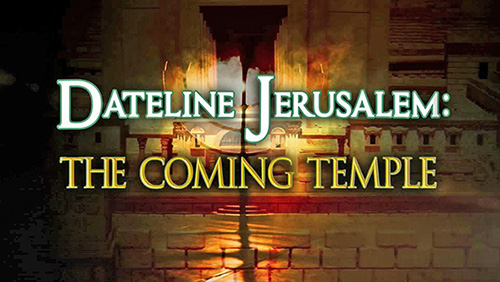
Dateline Jerusalem
Places of Worship — King Solomon built a magnificent Temple in Jerusalem. As prophesied by Jeremiah, this Temple eventually was destroyed by the Babylonians. The exiles who returned to Jerusalem built a Second Temple, but it was later destroyed by the Romans. Still, Scripture offers hints and allusions that another Temple is part of God’s divine plan.
Way of Worship — The Bible’s books of the Law give meticulous instructions for worship in the Tabernacle and the Temple. By Yeshua’s time, however, merchants violated the Temple’s sanctity, prompting the Lord’s demand: “Stop making My Father’s house a marketplace!” (John 2:16). Prophetic insights point to a future time when another Temple’s sacredness will be similarly desecrated.
Need for Worship — Following centuries of dispersion known as the Diaspora, Jewish people returned en masse to their ancestral homeland even before Israel’s establishment as a nation in 1948. This return, however, mostly occurred without a strong sense of faith in God. This is evident in the city of Tel Aviv, which reflects modern thinking and limited spiritual awareness. Even so, Scripture prophesies a coming time when the nation will experience a spiritual revival and worship of the God of Israel as outlined in the Law of Moses. This revival will involve the reinstatement of the sacrificial system in a Third Temple.
Next Place of Worship — The prophet Ezekiel had a vision of a reconstructed and expanded Temple, while the Apostle Paul spoke of the antiChrist defiling God’s Temple. As these prophecies have not occurred in the past, obviously they are to be fulfilled in the future. The Bible unequivocally reports the building and functioning of a Temple before the culmination of the End Times.
 Zola Levitt Ministries is ECFA approved and has Charity Navigator’s top rating of 4 stars, plus Ministry Watch’s Give With Confidence Score of 100.
Zola Levitt Ministries is ECFA approved and has Charity Navigator’s top rating of 4 stars, plus Ministry Watch’s Give With Confidence Score of 100.


